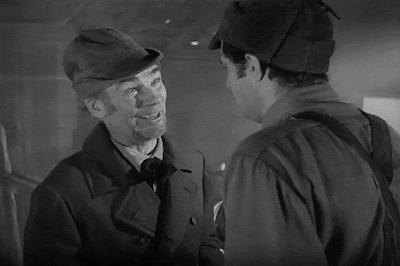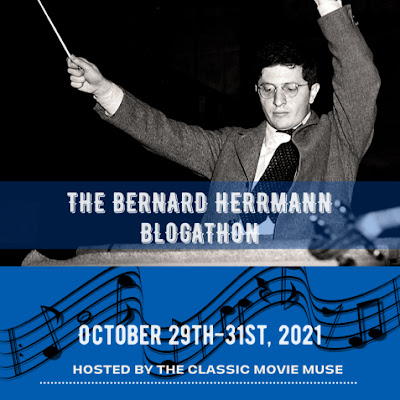Bernard Herrmann é considerado um dos melhores compositores da história do cinema. Tendo trabalhado como compositor em 90 filmes – alguns deles feitos após sua morte usando sua música – é surpreendente que ele tenha sido indicado ao Oscar apenas cinco vezes – nenhuma delas por trabalhos nos filmes de seus colaborador constante, Alfred Hitchcock – e tenha ganhado apenas uma estatueta, em seu primeiro ano em Hollywood. O filme que deu a Herrmann seu único Oscar é “O Homem que Vendeu a Alma”.
Bernard Herrmann is considered one of the best composers in film history. Having worked as a composer in 90 titles – some of them movies made after his death that use his music – it’s a surprise to learn that Herrmann was nominated for the Oscar only five times – none of them for movies by his constant collaborator, Alfred Hitchcock – and won only once, in his very first year in Hollywood. The movie that gave Herrmann his sole Oscar is “All That Money Can Buy”, sometimes seen under the title “The Devil and Daniel Webster”.
É uma história que aconteceu há muito tempo, mas que poderia acontecer em qualquer momento, em qualquer lugar, com qualquer um – até mesmo com você, querido espectador. O fazendeiro Jabez Stone (James Craig) vem sofrendo com uma maré de azar. Ele está se sentindo tão mal que diz em voz alta que estaria disposto a fazer um pacto com o diabo em troca de melhorias. O diabo o escuta, aparece sob a forma de Mr Scratch (Walter Huston) e Jabez vende sua alma em troca de sete anos de prosperidade. Instantaneamente, Jabez enriquece e começa a comprar roupas e chapéus para sua esposa Mary (Anne Shirley) e sua mãe (Jane Darwell). E não demora muito para que ele deixe de frequentar a igreja para jogar cartas com os novos amigos.
It’s a story that happened a long time ago, but one that could happen anytime, anywhere, to anybody – even to you, dear viewer. Farmer Jabez Stone (James Craig) has been having a lot of bad luck lately. He’s feeling so unlucky and miserable that he says out loud that he’d be willing to make a pact with the devil to see things improving. The devil hears, appears in the form of Mr Scratch (Walter Huston) and Jabez sells his soul in exchange of seven years of good luck. Instantly, Jabez becomes rich and starts buying dresses and hats for his wife Mary (Anne Shirley) and his mother (Jane Darwell). And it doesn’t take long until he starts not going to church and instead playing cards with his new friends.
Mas quem diabos é Daniel Webster? Daniel Webster (Edward Arnold) é um político de Massachusetts que leva jeito com as palavras. Um dia, logo depois de Jabez fazer o pacto com o diabo, Daniel Webster visita a cidade vizinha à fazenda dele e se torna amigo de Jabez. Mary troca cartas com Daniel Webster e até mesmo dá ao seu filho o nome de Daniel. Mary então chama Daniel Webster para ajudar quando Jabez se torna arrogante e muito ambicioso, e Daniel Webster terá de usar suas palavras contra o diabo.
But who the hell is Daniel Webster? Daniel Webster (Edward Arnold) is a politician from Massachusetts who has a talent for words. One day, right after Jabez makes the pact with the devil, Daniel Webster visits the town near his farm and befriends him. Mary corresponds with Daniel Webster frquently, and even names her son Daniel after the politician. Mary then calls Daniel Webster to interfere when Jabez becomes arrogant and overly ambitious, and Daniel Webster will have to use his words against the devil.
Uma das muitas tentações que Jabez terá de enfrentar tem um belo rosto: é Belle (Simone Simon), sua nova empregada. O papel mais lembrado de Simone é como a protagonista de “Sangue de Pantera” (1942), um filme para o qual Bernard Herrmann fez arranjos para uma música, sem receber crédito. Simone Simon foi escalada para “Sangue de Pantera” depois que o produtor Val Lewton viu sua performance como a tentadora diabólica em “O Homem que Vendeu a Alma”.
One of the many temptations that Jabez will have to face has the prettiest face: Belle (Simone Simon), his new maid. Simon’s best remembered role is as the lead of “Cat People” (1942), a film in which Bernard Herrmann worked as an arranger for one song, for which he didn’t receive credit. Simone Simon was cast in “Cat People” after producer Val Lewton saw her turn as the devil’s temptress in “The Devil and Daniel Webster”.
A trilha sonora é excelente. Em determinado momento, há melodias idílicas que fazem a vida no campo soar como um paraíso, e no minuto seguinte há notas macabras. Há também momentos tensos e fantásticos marcados pela música, e há também algumas canções folclóricas. Tudo isso levou à vitória histórica de Herrmann na categoria Melhor Trilha Sonora Original, uma vitória mais que merecida. O que pode ter ajudado é que Herrmann já estava familiarizado com a história, pois compôs a trilha sonora para a adaptação de “O Homem que Vendeu a Alma” para o rádio em 1938.
The soundtrack is amazing. At one point, there are idyllic melodies that make life in the country sound like a paradise, and in the next minute there is a macabre tune. There are also tense moments and fantastic moments marked by music, and there are some folk tunes as well. All this led to Herrmann’s historical win in the Original Music Score category, a win that was very much deserved. What might have helped was that Herrmann was no strange to the story, as he had composed the soundtrack for the radio adaptation of “The Devil and Daniel Webster” in 1938.
Assim como o primeiro filme de Herrmann – “Cidadão Kane” – “O Homem que Vendeu a Alma” foi feito pelos estúdios RKO. Foi o primeiro filme que o diretor William Dieterle fez servindo também como produtor, e era a adaptação de um conto publicado em 1936 e adaptado para os palcos em 1939. Dieterle fez muitas experiências com o filme – um filme que herdou parte da quipe que trabalhou em “Cidadão Kane” – e a produção ficou acima do orçamento, o que se mostrou um problema.
Like Herrmann’s first film – “Citizen Kane” – “The Devil and Daniel Webster” was made by RKO studios. It was the first movie director William Dieterle made also as a producer, and it was the adaptation of a short story published in 1936 and then adapted to the stage in 1939. Dieterle experimented a lot with this film – a film that inherited part of the crew that worked in “Citizen Kane” – and the production ran over budget, which became a problem.
“O Homem que Vendeu a Alma” é um filme de fantasia, mas tem alguns efeitos de iluminação interessantes – muitos deles parecem não ter sido feitos de propósito – que evocam o noir. Outro filme de fantasia com iluminação noir – e também com música composta por Bernard Herrmann! - é “O Fantasma Apaixonado” (1947).
“The Devil and Daniel Webster” is a fantasy movie, but it has some interesting lighting effects – many of them seem made not on purpose – that evoke a noir feeling. Another fantasy movie with noir lighting – and also with music composed by Bernard Herrmann! - is “The Ghost and Mrs Muir” (1947).
“O Homem que Vendeu a Alma” não é o primeiro filme a contar a história de alguém que vendeu sua alma ao diabo. Talvez a versão mais famosa de tal história seja Fausto, filmado em 1926 na Alemanha por F.W. Murnau. Numa curiosa coincidência, William Dieterle teve um papel de destaque neste filme como Valentin, que é morto por Fausto. “O Homem que Vendeu a Alma” também não foi o último filme a ter um julgamento com criaturas do outro mundo para decidir o destino de um homem: uma trama semelhante pode ser encontrada no magnífico filme britânico “Neste Mundo e no Outro” (1946).
“The Devil and Daniel Webster” is not the first movie to tell the story of someone who sold his soul to the devil. Perhaps the most famous version of such a story is Faust, filmed in 1926 in Germany by F.W. Murnau. In a curious coincidence, William Dieterle had a major role in this film as Valentin, who is killed by Faust. “The Devil and Daniel Webster” is also not the last movie to have a hearing with otherwordly creatures to decide a man’s fate: a similar plot is found in the superb British film “A Matter of Life and Death” (1946).
Você deve estar se perguntando, e aqui está a resposta: sim, existiu um político chamado Daniel Webster em Massachusetts. Ele foi um dos mais famosos advogados do século XIX e foi candidato na eleição presidencial de 1836, que ele perdeu – mas provavelmente não porque não aceitou fazer um pacto com o diabo.
You might be wondering, so here is the answer: yes, there was a real politician called Daniel Webster from Massachusetts. He was one of the most famous lawyers of the 19th century and was a candidate in the 1836 presidential election, which he lost – but probably not because he refused to make a deal with the devil.
“O Homem que Vendeu a Alma” foi um sucesso de crítica mas um fracasso de bilheteria. É mais que uma curiosidade, mais que o filme que deu a Bernard Herrmann o único Oscar de uma carreira brilhante. Quase tão bom quanto “Neste Mundo e no Outro”, este filme adapta a lenda de Fausto ao folclore norte-americano e acrescenta à história mágica e, por mais estranho que pareça, patriotismo. É realmente um filme único.
“The Devil and Daniel Webster” was a critical success but a box-office failure. It’s more than a curiosity as it gave Bernard Herrmann the sole Oscar in an outstanding career. Almost as good as “A Matter of Life and Death”, this film adapts the Faust legend to American folklore and infuses the story with magic and, as oddly as it may sound, patriotism. It’s truly an unique gem.
This is my contribution to the Bernard Herrmann blogathon, hosted by The Classic Movie Muse.









5 comments:
A lovely review. I can never turn away from The Devil and Daniel Webster. It is the story and Huston's performance that first drew me in, but somewhere along the way, I realized how much Herrmann's score influenced my fascination with the movie.
Wonderful look at this film, Le! You've chosen fascinating material to include - such as Dieterle's involvement in Murnau's film and that Lewton spotted Simone here - as well as capturing the spirit and magic of this unique film.
Thanks so much for contributing this great post to my blogathon!! :)
Excellent review! You make me want to re-watch Daniel Webster.
It's incredible that Bernard Herrmann won so few Oscars. Sometimes I think he should have won for all his films...
Glad Herrmann got one Oscar--the Academy vastly underrated him.
Post a Comment